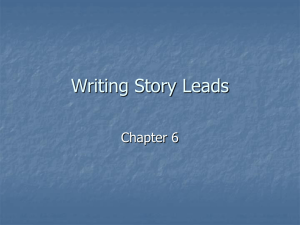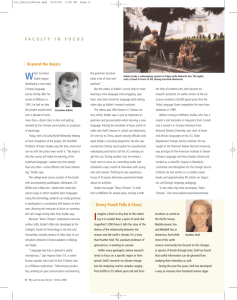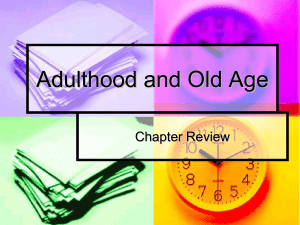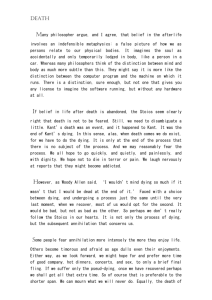Outline eng - Seminar126G-Chocos
advertisement
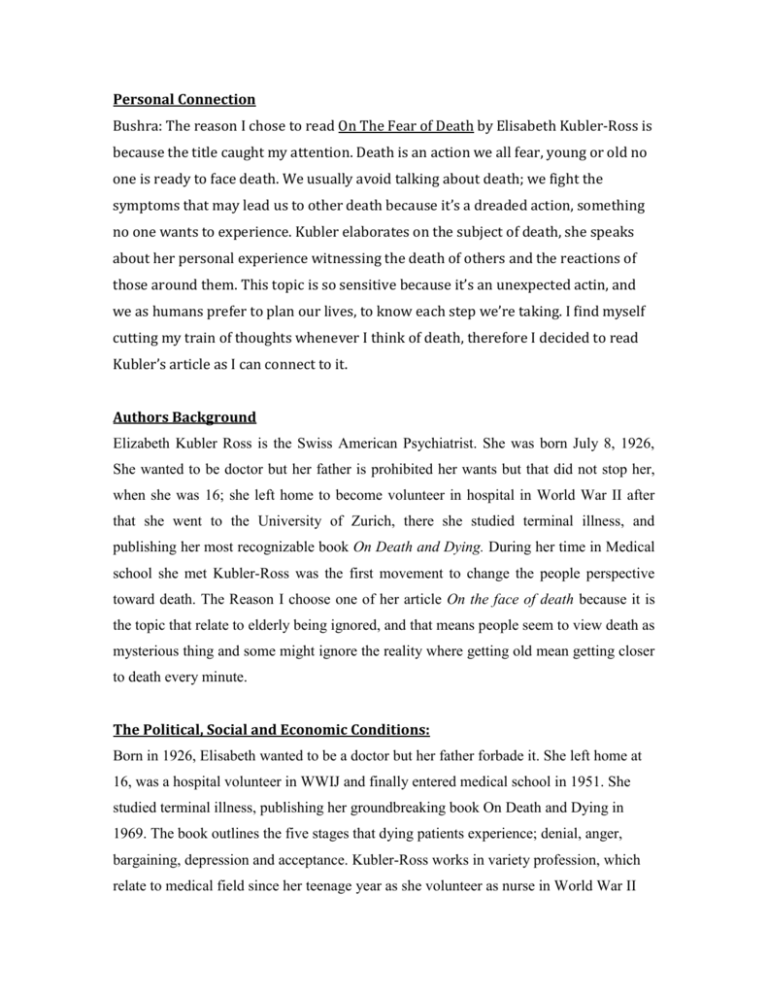
Personal Connection Bushra: The reason I chose to read On The Fear of Death by Elisabeth Kubler-Ross is because the title caught my attention. Death is an action we all fear, young or old no one is ready to face death. We usually avoid talking about death; we fight the symptoms that may lead us to other death because it’s a dreaded action, something no one wants to experience. Kubler elaborates on the subject of death, she speaks about her personal experience witnessing the death of others and the reactions of those around them. This topic is so sensitive because it’s an unexpected actin, and we as humans prefer to plan our lives, to know each step we’re taking. I find myself cutting my train of thoughts whenever I think of death, therefore I decided to read Kubler’s article as I can connect to it. Authors Background Elizabeth Kubler Ross is the Swiss American Psychiatrist. She was born July 8, 1926, She wanted to be doctor but her father is prohibited her wants but that did not stop her, when she was 16; she left home to become volunteer in hospital in World War II after that she went to the University of Zurich, there she studied terminal illness, and publishing her most recognizable book On Death and Dying. During her time in Medical school she met Kubler-Ross was the first movement to change the people perspective toward death. The Reason I choose one of her article On the face of death because it is the topic that relate to elderly being ignored, and that means people seem to view death as mysterious thing and some might ignore the reality where getting old mean getting closer to death every minute. The Political, Social and Economic Conditions: Born in 1926, Elisabeth wanted to be a doctor but her father forbade it. She left home at 16, was a hospital volunteer in WWIJ and finally entered medical school in 1951. She studied terminal illness, publishing her groundbreaking book On Death and Dying in 1969. The book outlines the five stages that dying patients experience; denial, anger, bargaining, depression and acceptance. Kubler-Ross works in variety profession, which relate to medical field since her teenage year as she volunteer as nurse in World War II and volunteered t help in numerous war torn community. She also teach in University of Colorado both her husband and her has internship in Community Hospital in Glen Cove, Long Island. She is also specializing in psychiatry. She wrote more than 20 books on death and related topic Writing Style On the face of death The article is written as doctor report and comment, it has include many first person narrate, description, her thought of topic such as she states death as “Mysterious” to mankind. She also provide real life example from the funeral around the world and people of that certain culture view toward the death. She discuss the spread of better medication where it push the old age to another step, where people get old slowly due to the cure of many diseases which take life’s before the age of death. She also question the society about how people react to the death and how people teach the children about it. She also begins her writing with poem from Tagore the man who is first movement of Independent India. Where relate to the topic of trying to overcome the fear of death. Kubler writes On The Fear of Death using her own perspective. She talks about real situations she had witnessed and analyzes them. She does not associate herself with the situations, however she elaborates and explains each situation in detail. She uses real life situations that the reader can easily relate to, she also uses a storyteller technique where each situation she explains and elaborates is a story. This style of writing helps the readers get engaged and relate to the topic. Kubler uses first person technique through out the article. She gives her opinion on a certain topic and then expands by giving reasons, for example: Dying becomes lonely and impersonal”(105). Is her opinion, she then moved to her reason by stating “because the patient is often taken out of his environment”(105). This style of writing is one that persuades the reader to believe and agree with her point of view, as supporting evidence are given. Purpose or Message This book opened up a field that had been tightly closed due to cultural restrictions and medical implications. We all avoid the discussion about death, Kubler’s purpose was to break this barrier. She talked the reader through her own experience, went deeper in the matter of death, and sent a message of what to expect when the time comes. She did not send direct messages to the reader such a commands, however indirect messages were sent through the stories and situations she mentioned, she also supported her messages that she purposely wanted the reader to get by using evidence and support, and of course no one will have a powerful say in the matter of death as the those whom witness it. Quotations Quote: “He may cry for rest, peace, and dignity, but he will get infusions, transfusions, a heart machine, or tracheotomy if necessary.” Meaning: this quote shows how weak a human being actually is, the quote has a bigger meaning than what we ask for and what we get. It symbolizes the weakness of humans. It represents the cycle we go through, the development cycle, and once it comes to an end, no action nor tears will be able to give an individual his necessities. Quote: “It is clear that whatever the answer may be, the patient suffering more – not physically, perhaps, but emotionally. And his needs have not changed over the centuries, only our ability to gratify them.” Meaning: this quote supports the idea that as humans grow older, we still hold the same needs with us, the only thing that changes is our ability to actually satisfy these needs. We may not be suffering physically but the elder are surely suffering emotionally. The emotional suffering comes as the process of accepting death begins, this is a huge step forward for any human who blind folded himself from death his entire life, and is now expected to accept it without a say. Personal Observation After reading Kubler’s article, I have observed that it’s human nature to distinct themselves from any death matter; whether it’s talking about death or experiencing the death of another acknowledged individual, we as humans tend to avoid this topic as much as possible. Therefore when death hits someone, the surrounding is not yet developed or ready to accept this tragedy, as its one that they avoided to think about their entire life. As we grow older we start to think about death more, death is mostly associated with elderly people, although statistics show that there is a high percentage of kids dying. This is because humans avoid death matters till the last development stage, when the cycle starts to come to an end, they start facing it, and although they accept in at some point –not all do- but their surrounding and their loved ones are not yet mentally developed to accept the dreaded action, death.
